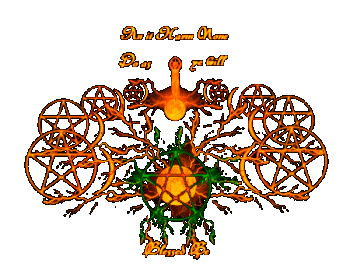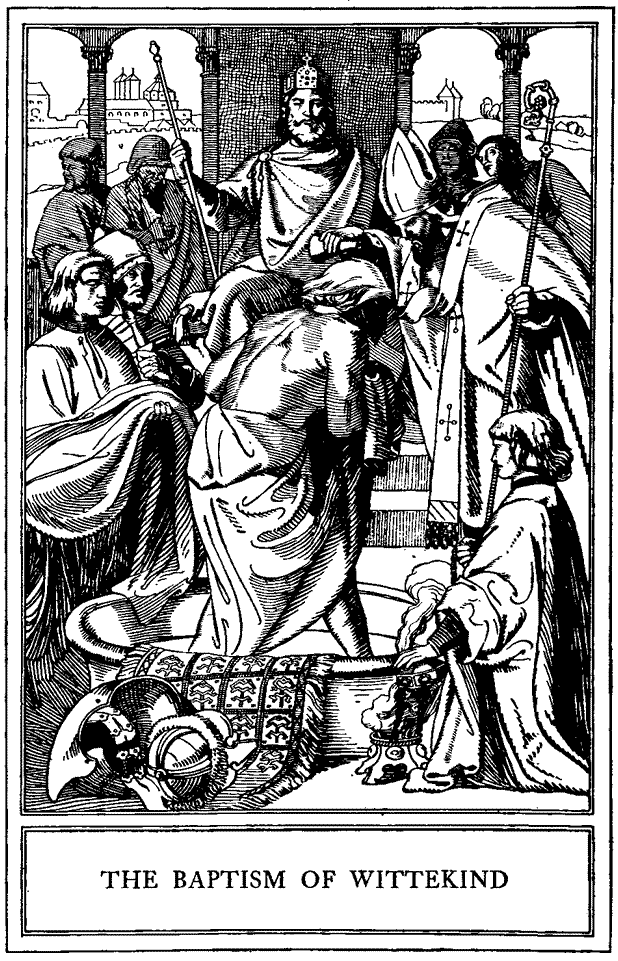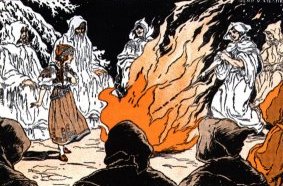






THE ORIGIN OF HALLOWE'EN
What about this strange festival?
What have goblins, witches and ghosts to do with this feast of All Hallows Eve? And why the demoniacal masks and gaudy decorations?
EACH YEAR millions around the world observe the strangest of all festivals, Hallowe'en -- All Hallows Evening. Especially so in Great Britain, Scandinavia and the United States. Every autumn, young and old alike anticipate its revels. It's a night of frolicking fun and frivolous foolishness. All kinds of nonsense and superstitions are associated with this festival.
But Why?

On the eve of this night children dress in outrageous costumes and put on witch-like masks. Then they are turned loose to frighten or otherwise induce people into giving them food items and other gifts. Millions are familiar with the "trick-or-treat" threat associated with Hallowe'en. Buildings are desecrated, windows broken and other fooleries are resorted to.
WHY do so many keep Hallowe'en? What useful purpose does such a celebration fulfill in this "enlightened" scientific twentieth century? What purpose did it ever serve? Is it merely a harmless celebration to amuse our children? It's about time we checked into this observance to see WHERE and WHEN it really originated and FOR WHAT PURPOSE it was established.
You may not have realized it, but the ancient pre-Christian Druids in Britain, the pagan Romans and Greeks, and even the Babylonians, among others, kept a Hallowe'en festival.
Not Christian

Yes, Hallowe'en long antedates Christianity! It was only later introduced into the professing Christian world -- centuries AFTER the death of the Apostles. Notice! "The earliest Hallowe'en celebrations [in Britain] were held by the Druids in honour of Samhain, Lord of the Dead, whose festival fell on November 1" (see "Halloween Through Twenty Centuries", by Ralph Linton, p. 4). "It is clearly a RELIC OF PAGAN TIMES"! ("The Book of Days", Chambers, v. 2, p. 519.)
Further, "It was a Druidical belief that on the eve of this festival Saman, lord of death, called together the wicked spirits that within the past 12 months had been condemned to inhabit the bodies of animals" ("Enc. Brit.", 11th ed., v. 12, pp. 857-8). Read what this November celebration was like! It was a pagan belief that on one night of the year the souls of the dead return to their original homes, there to be entertained with food. If food and shelter were not provided, these spirits, it was believed, would cast spells and cause havoc towards those failing to fulfill their requests. "It was the night for the universal walking about of all sorts of spirits, fairies, and ghosts, all of whom had liberty on that night" ("Highland Superstitions", Alexander Macgregor, p. 44). Literal sacrifices were offered on this night to the spirits of the dead, when, so the belief went, they visited their earthly haunts and their friends.
There was a reason why November was chosen for that particular event. The Celts and other Northern people considered the beginning of November as their New Year. This was the time when the leaves were falling and a general seasonal decay was taking place everywhere. Thus it was a fitting time, so they reasoned, for the commemoration of the dead. Since the Northern nations at that time began their day in the evening, the eve leading up to November 1st was the beginning of the festival. According to the Roman calendar it was the evening October 31 -- hence, Hallowe'en -- the evening of All Hallows.
Observed Everywhere

Hallowe'en, or "All Souls Eve," was kept throughout the ancient pagan world. The observance was widespread. "There was a prevailing belief AMONG ALL NATIONS that at death the souls of good men were taken possession of by good spirits and carried to paradise; but the souls of wicked men were left to wander in the space between the earth and moon, or consigned to the unseen world. These wandering spirits were in the habit of HAUNTING THE LIVING ... BUT THERE WERE MEANS BY WHICH THESE GHOSTS MIGHT BE EXORCISED" ("Folklore", James Napier, p. 11).
To exorcise these ghosts, that is, to free yourself from their supposed evil sway, you would have to set out food and provide shelter for them during the night. If they were satisfied with your offerings, it was believed they would leave you in peace. If not, they were believed to cast an evil spell on you. "In Wales it was firmly believed that on All Hallows Eve the spirit of a departed person was to be seen at midnight on every crossroad and every stile" ("Folklore and Folk-Stories of Wales", Marie Trevelyan, p. 254).
In Cambodia people used to chant: "O all you our ancestors, who are departed, deign to come and eat what we have prepared for you, and to bless your posterity and to make it happy" ("Notice sur le Cambodge", Paris 1875, E. Aymonièr, p. 59).
This sort of Hallowe'en festival was strenuously observed throughout the non-Christian world. Pagans would pray to their false gods to prevent "DEMONS" and "witches" from molesting them. Notice! "The Miatecs of Mexico believed that the souls of the dead came back in the twelfth month of the year, WHICH CORRESPONDED TO OUR NOVEMBER. On this day of All Souls the houses were decked out to welcome the spirits. Jars of food and drink were set on a table in the principal room, and the family went out with the torches to meet the ghosts and invite them to enter. Then, returning to the house they knelt around the table, and with their eyes bent on the ground, prayed the souls to accept the offerings" ("Adonis", Frazer, p. 244).
This, then, is the way the heathen world celebrated their Hallowe'en, their "All Souls Day". Although some aspects of the Hallowe'en festival varied with each country, the overall pattern and purpose remained the same.
Hallowe'en "Christianized"

Halloween "programs" are held, and children taught pagan practices in Churches Worldwide.
But how did the professing Christian world come to accept and keep such a day? Here is what you, probably, haven't been told. In 607 A.D. the Roman Emperor Phocus defeated the Barbarians who were in control of Rome. The Pantheon in Rome, a pagan edifice which had been wrested from the barbarians, was given to pope Boniface IV. Originally, Emperor Hadrian built the Pantheon -- around 100 A.D. He dedicated it to the pagan goddess Cybele and to the other Roman deities. This temple became the central place in Rome where the pagans honored and commemorated their gods. With this splendid edifice now falling into the hands of professing Christians, the question was, What should be done with it?
The pagans had dedicated it to Cybele and all their gods. But the Roman bishop now CONSECRATED IT TO THE VIRGIN MARY AND ALL THE SAINTS of both sexes (see "The Mysteries of All Nations", Grant, p. 120). Thus this pagan building became "holy." No more did the pagan Romans use this edifice to pray for their dead. It was now the professing Christians who employed the Pantheon in praying for their dead.
This re-dedication of the pagan temple to Mary and others occurred in 610 A.D. Now converted into a Christian shrine, an annual festival was instituted to commemorate the event. The day chosen was May 13.
This May 13 commemoration of the dead saints was known by the name of "All Saints Day." It continued to be held in May for over two centuries -- until 834 A.D. In that year the NAME and the DATE WERE CHANGED.
Notice! "The time of celebration was altered to the FIRST OF NOVEMBER, and it was then called ALL HALLOW" -- from where we get the name Hallowe'en, ALL HALLOW merely meaning ALL HOLY, and the "een" is a contraction of evening ("Folklore", James Napier, p. 177).
Thus in 834 A.D. the Church in the Middle Ages began to celebrate Hallowe'en on the FIRST OF NOVEMBER for the first time. This was the very same day the Druids in Britain, the Norsemen in Scandinavia, and the pagan Germans among others were keeping their festival of ALL SOULS EVE, in commemoration of Saman, lord of death, and his demons.
Reason for Change
Why did the church change the date to November 1st, thus coinciding with the pagans' feast of ALL SOULS?
There is a reason!
It was a general practice of the restored Roman Empire, now professing Christianity, to "convert" the pagans within the empire as quickly and on as large a scale as possible. Changing dates of festivals often made it easier to influence newly conquered peoples.
Ever since the time of Constantine -- who made a state religion out of Christianity -- the Roman emperors realized how essential it was to have a UNIFIED empire, in which as many as possible would be of ONE MIND. The civil and religious leaders saw how important it was for the sake of unity to ALLOW ONLY ONE RELIGION within the restored Roman domain. It became therefore a stringent state policy to force all non-Christians to accept the new state religion. Here is how the plan was carried out.
Conversion of Germans


When the German Frankish king Charlemagne invaded and conquered parts of Eastern Germany, he compelled the conquered German king, Wittekind, to be baptized and to accept Christianity. Having no choice and seeing his life was at stake, this heathen ruler who knew little or nothing about Christ -- was forced into this "conversion." And with him his entire people. This policy brought complex problems. These pagans, who were usually baptized EN MASSE, were still pagans at heart. Even though they became nominal Christians, they still yearned for many of their heathen practices, which they were expected to discard.
With Wittekind's baptism, for example, a vast number of barbarians were suddenly added to the roll call of the church. Wittekind's Germans, now professing Christians, and other conquered pagans, had a profound influence on the ecclesiastical affairs of the church in the early 800's A. D. These barbaric and uncultured people brought with them many outright pagan practices and celebrations, Hallowe'en merely being one of many. They were fervent in clinging to their past ceremonies and observed them openly -- yet supposedly converted to Christianity. What was the church to do? Excommunicate them and thus reduce her membership? This she would not do. Was she to force them into discarding their heathen practices and adopt Italian or Roman ones? This, as she had learned in past times, was not possible.
There remained only one other way. Let the recently converted pagans keep certain of their heathen festivals, such as Hallowe'en or All Souls Day -- but label it "Christian." Of course the Germans were asked not to pray to their ancient pagan gods on this day. They must now use this day to commemorate the death of the saints. To make it easy for them, the Roman Church even CHANGED HER DATE of All Saints Day from May 13 to November 1st to satisfy the growing numbers of Germanic adherents. The Church understood the yearnings the Germans and others had for their old ways.
Throughout history, the Christian-professing world has resorted to this action. We have the theological explanation of this given to us by Pope Innocent. He refers to a heathen festival the pagans kept in the early part of the Roman Empire and explained how the professing Christian world should treat this day:
"The heathen dedicated this month [2 Feb.] to the infernal gods ... In the beginning of this month the idolaters walked about the city with lighted candles, and as some of the holy fathers COULD NOT EXTIRPATE SUCH A CUSTOM, they ORDAINED that Christians should carry about candles IN HONOUR OF THE "VIRGIN MARY" ("Folklore", James Napier, p. 181).
If a pagan practice or festival could not be forbidden, it was reasoned, "let it be tamed." Thus many were persuaded to TRANSFER devotion from their former gods to the Christian God. So it was with the festival of ALL SOULS EVE. Notice this admission: "Thus, at the first promulgation of Christianity to the Gentile nations ... THEY COULD NOT BE PERSUADED TO RELINQUISH many of their superstitions, which, rather than forego altogether, they chose to blend and INCORPORATE with the new faith" ("Popular Antiquities of Great Britain", John Brand, p. xi).
What About Our Time?
Now come down to the twenty first century. You'll be surprised to what extent we have inherited pagan rites and ceremonies from our forefathers, so obvious in the celebration of Hallowe'en. Note this classic example. "In many Catholic countries the belief that the DEAD RETURN on this day is so strong, that food is left on the tables and people still decorate the graves of the dead [on this day]" ("Dictionary of Folklore", Funk and Wagnalls, v. 1, p. 38).
In Protestant countries many pagan superstitious beliefs and practices have become an integral part of each year's celebration.

Irish Halloween bonfire was the result of two weeks of building and collecting of materials by the local community.
In many parts of Britain, BONFIRES are set alight on the eve of Hallowe'en. Of course fire has nothing to do with praying for dead saints. The original reason for the fire, however, was to frighten away witches and evil spirits on this night. Fire has always been an essential part of Hallowe'en in Great Britain.

Samhain Fire: Samhain (Scots Gaelic: Samhuinn) literally means “summer's end.” Throughout the centuries, pagan and Christian beliefs intertwine in a gallimaufry of celebrations from Oct 31st through November 5th, all of which appear both to challenge the ascendancy of the dark and to revel in its mystery.
You and Your Children

What about you and your children? What comes to your mind when thinking about Hallowe'en? The truth of the Bible? Not at all! Instead, weird and FRIGHTENING MASKS -- persons PORTRAYED AS WITCHES AND DEMONS. Pumpkins and turnips hollowed out in the shape of EERIE-LOOKING faces! Lighted candles are placed inside to help bring out the more frightful side of these carvings. Dough is baked into small figurines RESEMBLING WITCHES AND SPIDER'S WEB CAKES are baked by the dozen for this occasion. Children, dressed up in the most revolting garments, are let loose on the neighbors, trying to scare the daylights out of them.
Let's be honest. I have before me the "Good Housekeeping's Book of Entertainment", which my wife picked up from the local library. On page 168 of this much-read book, there is a section on what to do on Hallowe'en. Notice the astonishing advice given!
"Halloween decorations are quite as important as the food. When planning them, remember that if the room is to be dimly lit (preferably by candle and FIRELIGHT) the decorations must be bold to be effective. Orange, black and red, THE DEVIL'S COLOURS, are the colours associated with Halloween and THIS SCHEME SHOULD BE CARRIED OUT as far as possible ... Have paper streamers and lanterns hanging from the ceiling, or, if you would like to have something less usual, you could make a giant SPIDER'S web with black and orange strings, or in narrow strips of crepe paper coming from the four corners of the room, complete with a LARGE SPIDER -- one of the DEVIL'S FAVOURITE FOLLOWERS."
Notice where the stress lies!
Read further of the black magic associated with this festival. "To decorate the walls, make large silhouettes of CATS, BATS, OWLS AND WITCHES ON BROOMSTICKS ... For the supper table small WITCHES WITH BROOMSTICKS can be made by using lollipops on 4-inch sticks."
Weird lanterns, witch-balls, and witches' cauldrons are some other objects, the book suggests, which must fit into the evening somehow. How pagan can you get?
NOWHERE does the Bible command us to observe Hallowe'en. Hallowe'en and other common festivals which people observe in the Christian-professing world have NO BIBLICAL BASIS. They originated in paganism.
The testimony of history stamps Hallowe'en as a HEATHEN festival. It's built on a PAGAN FOUNDATION. Your Bible warns: "For other foundation can no man lay than that is laid, which is Jesus Christ" (I Cor. 3:11).
Which is the BASIS of YOUR practice and belief?
Turn to Deuteronomy 12:29-31 and read God's condemnation of Hallowe'en! And visit our website for many other startling facts about holidays not included here!


It is our fervent hope that "The Origin of Halloween!", presented to you as a ministry of love, without money and without price, will bring those truly seeking God abundant blessings.
CHURCH OF GOD Faithful Flock
PO Box 8819 Modesto, CA 95357